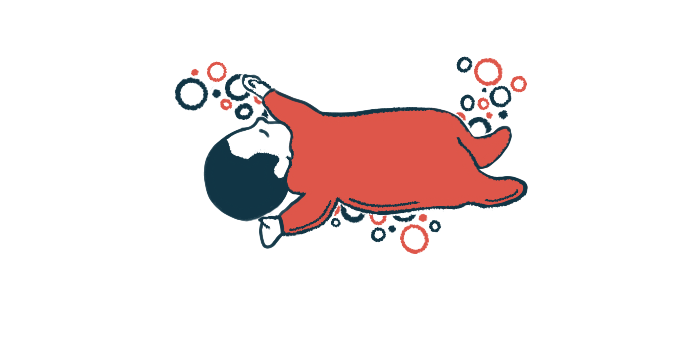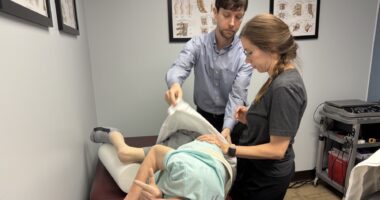26 newborns diagnosed with SMA in Russia through pilot program

Twenty-six children were diagnosed with spinal muscular atrophy (SMA) in Russia through a 2022 pilot program, out of nearly 203,000 newborns who were screened for the rare genetic disease.
That’s according to a study, “Epidemiology of Spinal Muscular Atrophy Based on the Results of a Large-Scale Pilot Project on 202,908 Newborns,” published in Pediatric Neurology.
“The findings of this study emphasize the importance and effectiveness of newborn screening for … SMA in identifying affected infants in the early stage,” the researchers wrote. “By identifying infants with … SMA through newborn screening, appropriate interventions and treatments can be initiated promptly, potentially improving the long-term outcomes and prognosis for these children.”
Best outcomes achieved when treatment is started early
The first treatment for SMA, Spinraza (nusinersen), became available in Russia in 2019, three years after its approval in the U.S. The oral SMA medication Evrysdi (risdiplam) was made available in Russia in 2020, and the gene therapy Zolgensma (onasemnogene abeparvovec-xioi) in 2021. All three therapies have been proven to slow the progression of SMA, with best results achieved when treatment is started as early as possible.
To help facilitate early treatment for children with SMA, many countries have begun to implement newborn screening programs, where all babies born are routinely tested for the genetic disorder. In 2022, scientists in Russia conducted a pilot study for an SMA newborn screening program in the country.
The pilot program covered eight regions in Russia, and over the course of the year-long program, 202,908 children were screened. That reflects slightly more than 96% of all babies born in the regions covered, and about one out of every six babies born in all of Russia in 2022.
“The present study conducted a newborn screening pilot program for … SMA in Russia, covering a large geographical area and diverse population,” the researchers wrote.
SMA is caused by mutations in the SMN1 gene. Everyone inherits two copies of this gene, and SMA will develop if both are mutated. The most common SMA-causing mutation is an exon 7 deletion, where a section of the SMN1 gene is entirely absent. In this screening program, children were specifically tested for the total absence of this section of the gene (implying they carried the same mutation on both copies of the gene). A limitation to this screening method is that, by design, it will not detect patients who have an SMA-causing mutation other than the exon 7 deletion, the researchers noted.
Infants underwent second round of genetic testing to confirm diagnosis
A total of 26 infants with SMA were identified through the initial screen. All 26 then underwent a second round of genetic testing to verify the results, which confirmed the diagnosis of SMA. The median time from birth to confirming the diagnosis was slightly longer than a month, and a little more than half of these infants were exhibiting symptoms indicative of SMA at the time of diagnosis.
With 26 children diagnosed out of more than 202,000 screened, this study estimates SMA affects roughly 1 out of every 7,800 babies born in Russia. This is similar to estimates from other studies in European countries such as Germany, the researchers noted, suggesting the incidence of “SMA in Russia is comparable to that in Europe.”
The SMN1 gene provides instructions to make a protein called SMN. A second gene, SMN2, is also able to produce SMN protein, but due to a quirk in the genetic sequence, much less SMN protein is made from SMN2. Still, to some extent SMN2 can act as a “backup” for the defective gene in SMA. People can have variable numbers of copies of the SMN2 gene, and patients with more copies tend to have less severe disease.
Among the 26 children diagnosed in the study, 21 had two or three copies of SMN2, and the remaining five children had four or more copies of the gene.
All of the children with two or three copies of the backup gene have received treatment, mainly with the one-time gene therapy Zolgensma. Two of the patients with more SMN2 copies have started treatment, while the other three (all of whom have so far experienced no SMA symptoms) are undergoing monitoring. The researchers noted there aren’t well-established guidelines for when to start treatment in children with SMA diagnosed through newborn screening but who have many copies of SMN2, highlighting a need for more research into best practices.
Delays in treatment were frequent
The researchers also noted delays in treatment were frequent. While most patients had the diagnosis confirmed in the first month or two after birth, most didn’t start on therapy until they were older than 3 months. One patient, who had two SMN2 copies and experienced a notable delay in treatment, died at 14 months old.
Reasons for delays in treatment included “both medical and nonmedical factors,” the researchers said, ranging from tests to ensure treatment eligibility to logistical issues with obtaining therapies. The importance of starting treatment as early as possible “underscores the need to minimize turnaround time and address these delays,” they wrote.
Since the pilot program in 2022, Russia has implemented SMA newborn screening nationwide, informed by the lessons learned from the pilot study, including steps to facilitate faster access to treatment.
This study was funded in part by Novartis, makers of Zolgensma, and the Russian pharma company Skopinpharm.
The post 26 newborns diagnosed with SMA in Russia through pilot program appeared first on SMA News Today.




